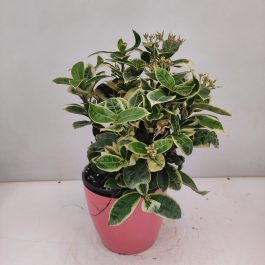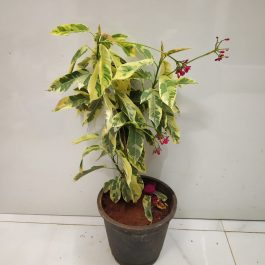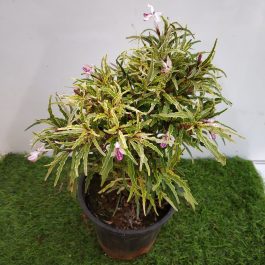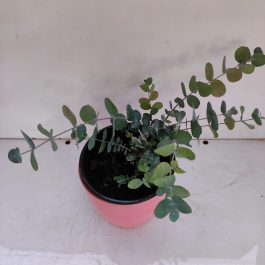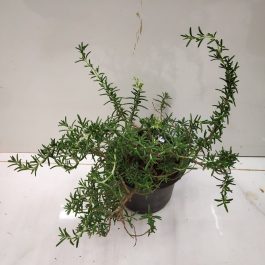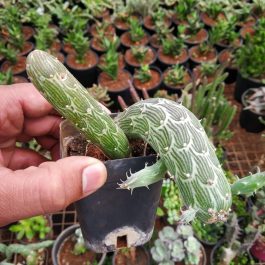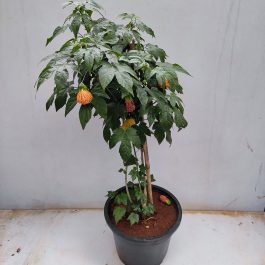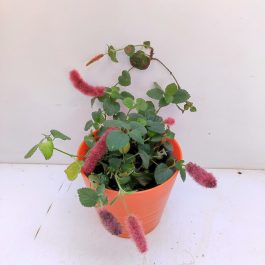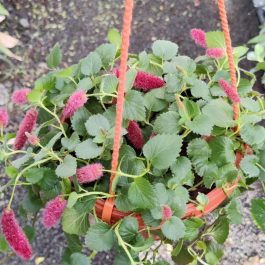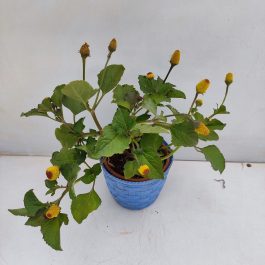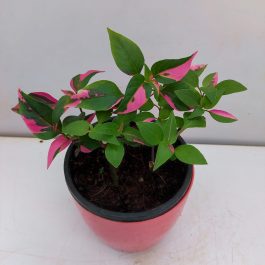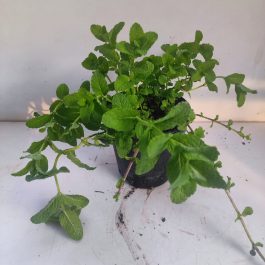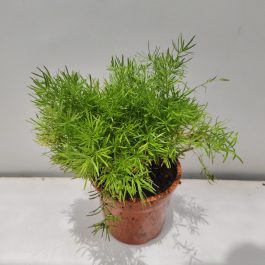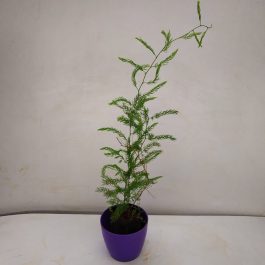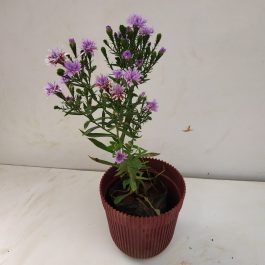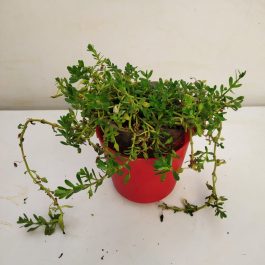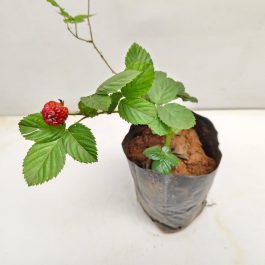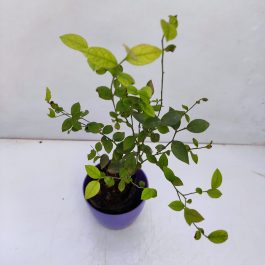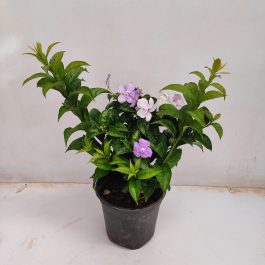Allamanda Schottii ‘ Silver’, Golden Trumpet has Silver-coloured leaves are elliptic in shape. Young leaves are slightly folded in a boat-like shape.
Showing 65–96 of 320 results
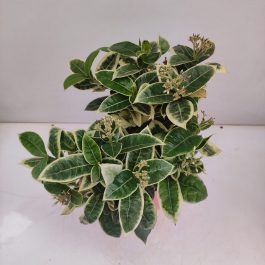
Ixora Variegated gets very nice heavily variegated leaves with lots of white splashes on the leaves. You will sometimes see more white then green leaves. A tall shrub with very showy foliage & clusters of white, insignificant flowers. Though very attractive as a foliage plant, it has a tendency to get scorched leaves.
Jatropha Integerrima ‘Variegated Jatropha’ an evergreen shrub or small tree with glossy leaves and clusters of star shaped bright scarlet flowers.Its leaves are 3-lobed, variegated with creamy and light green blotches.Its flowers are borne in clusters on long stalks. Individual flowers are red with 5 petals.
Plerandra elegantissima ‘Gold Crest’ also known as False Aralia is one of the more beautiful varieties, Gold Crest false aralias offers feathery green leaves edged in gold. Its leaflets are stalked, narrow, oblong and irregularly serrated.This medium- to slow-growing houseplant is one of the best for high-light situations.
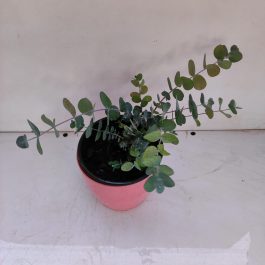
Eucalyptus Gunnii (Cider Gum Tree) is a very hardy variety with Sickle shaped glaucous leaves that are silver blue on younger trees, sage green on older trees. In late summer attractive clusters of white flowers appear on established trees.
Salvia Rosmarinus, commonly known as Rosemary, is a woody, perennial herb with fragrant, evergreen, needle-like leaves and white, pink, purple, or blue flowers. Rosemary has a long history of uses for a variety of medicinal and curative applications, some of which are of unsubstantiated value.
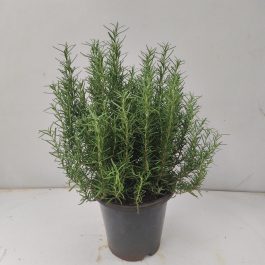
Salvia Rosmarinus, commonly known as Rosemary, is a woody, perennial herb with fragrant, evergreen, needle-like leaves and white, pink, purple, or blue flowers. Rosemary has a long history of uses for a variety of medicinal and curative applications, some of which are of unsubstantiated value.
The Senecio Pendulus also known as Inch Worm is a creeping cactus-like succulent with multi-coloured green stems and showy red blooms. It’s beautifully grey-green stems marbled in a pale green arch over and touch the soil where they root and send out new stems.
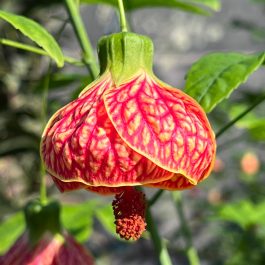
Chinese Lantern is an evergreen shrub producing an abundance of showy, orange, bell-shaped flowers adorned with prominent crimson veining. The flowers resemble Chinese lanterns, The leaves are shiny, maple-like and dark green.
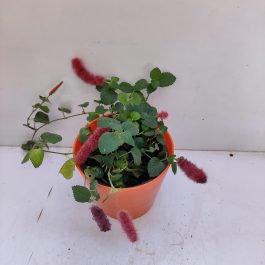
The Dwarf Chenille Plant, or Red Hot Cat’s Tail has a long bloom period and beautiful flowers that range from bright red to a deep pink color. It’s a great addition to any subtropical or tropical garden. Blooms year round.
The Dwarf Chenille Plant, or Red Hot Cat’s Tail has a long bloom period and beautiful flowers that range from bright red to a deep pink color. It’s a great addition to any subtropical or tropical garden. Blooms year round.
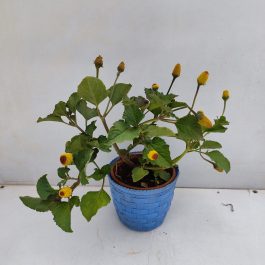
Acmella oleracea, or Toothache Plant, is an annual, flowering herb, It has round, yellow flowers with dark red spots in the center. These flowers, often called buzz buttons, The most common and widespread medicinal use is to treat toothache and throat and gum infections.
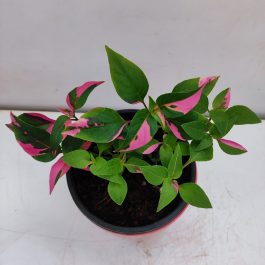
Crossandra infundibuliformis ‘Orange Sherbert’ This type of Clusters of widely flaring soft orange flowers are borne from spring to fall to year-round under warm tropical conditions and are held above and among the rich deep green foliage .
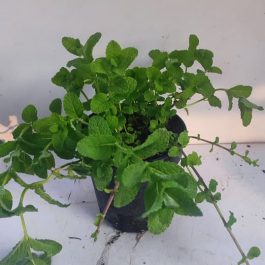
Mentha suaveolens, the apple mint, pineapple mint, woolly mint or round-leafed mint, is a member of the mint family Lamiaceae. They have toothed edges, deep veins, and a wrinkled, fuzzy texture thanks to a layer of fine hairs that cover both sides. Pineapple mint offers a mild, tropical, menthol aroma with a hint of pineapple and a subtle, sweet, fruity, and minty flavor.
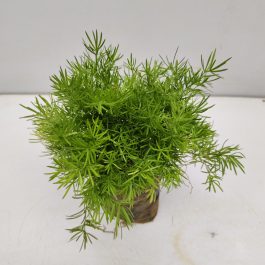
Asparagus Densiflorus is not a true fern, but it sure brings that soft, feathery charm! Its cascading green foliage creates a graceful arch, perfect for hanging baskets or tabletop elegance. Thrives best in bright, indirect light with moist, well-draining soil. A must-have for every indoor jungle lover!
Asparagus Racemosus (Shatavari) – it is perennial, aromatic and culinary type species of herb, the plant has green color leaves and , leaves and stems are edible, Shatavari is considered a general health tonic to improve vitality, making it a staple in ayurvedic medicine. Keep reading to learn more about the other health benefits it may offer.
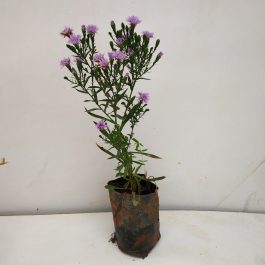
Aster tataricus, commonly called tatarian aster, is an erect, tall-growing species, Distinctive paddle-shaped, lower leaves are up to 24″ long and 6″ wide, but leaves are significantly smaller in size higher up on the plant. Small but abundant flowers with deep lavender to blue rays and yellow centers appear in flat-topped clusters in autumn.
Brahmi, Bacopa monnieri, is a tropical, perennial, non-aromatic herb used in Ayurveda medicine. It grows in rice fields and damp areas. Its leaves are succulent, oblong, thick, and arranged alternately. The flowers are small and white, with four to five petals. The leaves are edible – it can be eaten raw in mixed salads or cooked as a vegetable Bacopa monnieri, also called brahmi, water hyssop, thyme-leaved gratiola, and herb of grace.

The BlackBerry Fruit plants have biennial canes (stems) that are characteristically covered with prickles and are erect, semi-erect, or trailing; the thornless blackberry is a modern development. The leaves usually feature three or five oval, coarsely toothed, stalked leaflets, many of which persist through the winter. Borne on terminal clusters, the flowers are white, pink, or red and produce black or red-purple fruits .
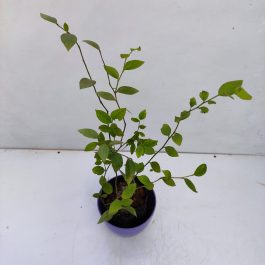
Blueberry plant is deciduous perennial shrub, They have simple elliptical leaves that are arranged alternately along the dotted stems. The plants produce clusters of small urn-shaped flowers that range in colour from white to pale pink. The fruits are true berries with many small seeds and are a deep indigo to black colour when ripe.
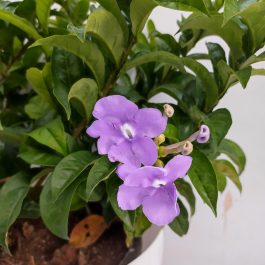
The Yesterday, Today and Tomorrow plant, or Brunfelsia latifolia, got its more common name because of its fragrant two-inch blooms. These flowers last for three days and change color with each day. The first day they are purple (yesterday), the second day they change to a pastel lavender shade (today), and on the third day they change to an almost white color (tomorrow). Because each flower lasts for three days and goes through this colorful transformation, it is easy to tell whether it is a yesterday bloom or a shade representing today and tomorrow.
